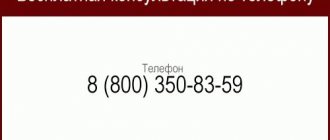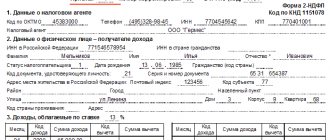Tax return
If you are late in submitting returns (VAT, property tax, income tax), the company will be fined under Article 119 of the Tax Code of the Russian Federation.
The fine is 5 percent of the tax that was not paid on time. Maximum - 30 percent of this amount, but not less than 1,000 rubles. The fine will be calculated for each full or partial month of delay with the declaration, counting from the date of its submission according to the Tax Code of the Russian Federation.
And if more than 10 working days have passed since the deadline for filing the declaration, the account will be blocked (subclause 1, clause 3, clause 3.2, article 76, clause 6, article 6.1 of the Tax Code of the Russian Federation).
In addition, the company's officials will also be punished. They will receive a warning or a fine of 300 to 500 rubles under Article 15.5 of the Code of Administrative Offenses of the Russian Federation.
A separate fine for a company is established by paragraph 1 of Article 126 of the Tax Code of the Russian Federation for income tax declarations - a fine of 200 rubles for each declaration that was not submitted on time. And for officials - a fine of 300 to 500 rubles, but under Article 15.6 of the Code of Administrative Offenses of the Russian Federation.
Read in the berator “Practical Encyclopedia of an Accountant”
Deadlines for paying taxes and submitting income tax returns
Property tax reporting
Procedure and deadlines for paying VAT and submitting declarations
Fines for failure to submit tax reports in 2021
If you did not have time to submit your declaration on time, then you will be charged 5% of the amount of unpaid tax payments. In addition, you will be required to pay 200 rubles for each document not submitted.
Be careful! Since 2015, VAT returns must be submitted electronically.
As a last resort, the accounts of legal entities may be frozen.
Delivered, but not on time
Failure to submit reports on time will also result in a fine. Therefore, if you submitted a declaration, but late, you will need to pay 1000 rubles.
Form 6-NDFL
For late submission of form 6-NDFL there will be:
- fine under paragraph 1.2 of Article 126 of the Tax Code of the Russian Federation. This is 1,000 rubles for each full or partial month from the date established for submitting the calculation;
- account blocking if more than 10 working days have passed since the deadline for filing 6-NDFL (subclause 1, clause 3, clause 3.2, article 76, clause 6, article 6.1 of the Tax Code of the Russian Federation);
- administrative punishment for officials under Article 15.6 of the Code of Administrative Offenses of the Russian Federation is a fine from 300 to 500 rubles.
Read in the berator “Practical Encyclopedia of an Accountant”
Deadlines for submitting form 6-NDFL
Fine for calculating insurance premiums: how to pay and how much?
The Federal Tax Service of Russia reported when and how to pay a fine for late submission of insurance premium calculations to the tax office.
When is the payment due?
Calculation of insurance premiums in the form approved by order of the Federal Tax Service of Russia dated October 10, 2016 No. ММВ-7-11/ [email protected] is submitted to:
- persons paying remuneration to individuals: organizations, individual entrepreneurs, individuals who are not individual entrepreneurs;
- heads of peasant (farm) households.
Organizations paying remuneration to individuals report to the tax office at the location of the organization and at the location of its separate divisions that pay remuneration to individuals. You must report on the results of the reporting and billing periods - the first quarter, half a year, nine months and the calendar year - no later than the 30th day of the next month (Article 423, paragraph 7 of Article 431 of the Tax Code of the Russian Federation).
Entrepreneurs and individuals who are not entrepreneurs paying remuneration to individuals submit their calculations within the same period to the inspectorate at their place of residence *.
____________________
* This rule does not apply to individuals who pay remuneration to non-entrepreneurs for the provision of services for personal, household and (or) other similar needs.
The heads of peasant (farm) households submit calculations only at the end of the year - before January 30 of the following year - to the tax office at the place of registration.
In any case, when the last day of the period falls on a weekend or non-working holiday, the end of the period is postponed to the next working day (Clause 7, Article 6.1 of the Tax Code of the Russian Federation).
Sanctions for failure to submit payments on time
If a tax return is not submitted within 10 working days from the date of expiration of its submission, the tax inspectorate has the right to suspend operations on the account of an organization or entrepreneur and transfers of electronic funds (subclause 1, clause 3, article 76 of the Tax Code of the Russian Federation). However, the rule on blocking an account does not apply to cases of failure to submit payments for insurance premiums, including those with zero indicators, since these calculations are not identical to tax returns ** (letter of the Ministry of Finance of Russia dated March 24, 2017 No. 03-15-07/17273, dated 01/12/2017 No. 03-02-07/1/556, Federal Tax Service of Russia dated 05/10/2017 No. AS-4-15/8659, dated 04/03/2017 No. BS-4-11/6174, dated 12/30/2016 No. PA-4 -11/25567).
__________________
** Please note: at the beginning of the year, the Russian Federal Tax Service considered blocking the account possible. It qualified payers of contributions as persons who are subject to the rules on suspension of transactions on bank accounts and transfers of electronic funds (letter of the Federal Tax Service of Russia dated January 27, 2017 No. ED-4-15/1444).
The sanction for a delay in submitting the calculation is different - a fine in the amount of five percent of the amount of contributions not paid on time, subject to payment (additional payment) on the basis of the calculation of contributions, for each full or partial month from the day established for submitting the calculation, but not more than 30 percent the specified amount and not less than 1000 rubles (clause 1 of Article 119 of the Tax Code of the Russian Federation).
Example.
The amount of the fine for failure to submit a calculation
Vector LLC submitted to the tax office a calculation of insurance premiums for the first quarter of 2021 on 05/03/2017. Since the report should have been made no later than 05/02/2017 (taking into account the postponement of the deadline, which falls on a weekend), the inspectorate will calculate the fine based on the amount of contributions not paid as of 05/02/2017. If, as of May 2, 2017, insurance premiums have been paid in full, the fine will be 1,000 rubles.
How to check the fine calculation
The amount of the fine under Article 119 of the Tax Code of the Russian Federation is determined:
- or as a percentage of the amount of contributions not paid on time;
- or in the minimum amount - 1000 rubles.
In any case, the fine is calculated separately for each type of compulsory insurance.
The inspectorate will distribute the minimum fine of 1,000 rubles based on the standards for splitting the basic tariff (30 percent) into individual types of insurance:
- for contributions to compulsory pension insurance - 733.33 rubles (22 / 30 * 1000);
- for contributions to compulsory social insurance in case of temporary disability and in connection with maternity - 96.67 rubles (2.9 / 30 * 1000);
- for contributions to compulsory health insurance - 170 rubles (5.1 / 30 * 1000).
How a fine of 1,000 rubles is distributed when the calculation is not submitted by the heads of peasant (farm) households who do not have hired workers and fill out only section 2 of the calculation is described in detail in paragraph 2 of the commented letter.
And the inspectorate will determine the fine as a percentage of the unpaid amount of contributions for persons paying remuneration to individuals as follows:
- summarizes the amounts of contributions not paid on time for each type of compulsory insurance;
- will calculate the fine as five percent of the unpaid amount of contributions for each type of insurance for each full or partial month from the day established for submitting the calculation, but not more than 30 percent of the unpaid amount of contributions.
How to pay a fine
The fine must be paid separately for each type of compulsory insurance - according to different BCCs, namely:
- for contributions to compulsory pension insurance - according to BCC 182 1 0210 160;
- for contributions to compulsory social insurance in case of temporary disability and in connection with maternity - according to BCC 182 1 0210 160;
- for contributions to compulsory health insurance - according to BCC 182 1 0213 160.
And sanctions against the heads of peasant farms should be paid:
- for contributions to compulsory pension insurance - according to BCC 182 1 0210 160;
- for contributions to compulsory health insurance - according to BCC 182 1 0213 160.
Form SZV-STAZH
For delaying the SZV-STAZH form, the fine can be very significant - 500 rubles for each insured individual and the same amount for errors in the report (Article 17 of the Federal Law of April 1, 1996 No. 27-FZ).
Company officials will be fined 300 - 500 rubles (Article 15.33.2 of the Code of Administrative Offenses of the Russian Federation).
To avoid a fine for an error, clarify the report within 5 working days from the date when the Pension Fund sends the protocol.
Read in the berator “Practical Encyclopedia of an Accountant”
Deadline for submitting a report on the SZV-STAZH form to the Pension Fund of Russia
Financial statements
The amount of liability for violations with the submission of accounting (financial) statements to the State Register of Financial Institutions largely depends on whether they are subject to mandatory audit or not.
If the reporting is not subject to mandatory audit, then for a delay of no more than 10 days the fine will be from 5,000 to 10,000 rubles. For delay of more than 10 days, but not more than 30 days - from 20,000 to 30,000 rubles. The same amounts apply for late reporting, which is subject to mandatory audit.
Well, if you are delayed by more than 30 days, you will have to pay:
- from 50,000 to 70,000 rubles, if the reporting is not subject to mandatory audit;
- from 300,000 to 500,000 rubles, if the reporting is subject to mandatory audit.
Also, for failure to submit reports or provision of incomplete reports, you will be fined:
- from 100,000 to 200,000 rubles, if the reporting is not subject to mandatory audit;
- from 500,000 to 700,000 rubles, if the reporting is subject to mandatory audit.
In addition, for organizations whose reports are not posted in the State Register of Internal Affairs, the fine is 200 rubles for each document that was not submitted on time (Clause 1 of Article 126 of the Tax Code of the Russian Federation).
For organizations that are required to post reports in the State Register of Administrative Inspections, a fine of 3,000 to 5,000 rubles (Article 19.7 of the Code of Administrative Offenses of the Russian Federation).
And company officials can be fined from 300 to 500 rubles (Article 15.6, Article 19.7 of the Code of Administrative Offenses of the Russian Federation).
Read in the berator “Practical Encyclopedia of an Accountant”
How to submit reports to the tax office
Results
The size of fines for failure to submit tax reports does not differ in variety.
It’s easy to remember them: if you’re late with your declaration, get ready to shell out at least 1,000 rubles from your “pocket.” Minimum 300 rubles. It will cost the manager a fine (if you're lucky, you can get off with a warning). It is highly undesirable to be late in submitting your declaration by more than 10 days, since such a delay will give the tax authorities grounds for suspending transactions on bank accounts. You can find more complete information on the topic in ConsultantPlus. Free trial access to the system for 2 days.
Accounting policy
If, during an inspection, inspectors discover that the company does not have an accounting policy, this threatens serious financial losses for the company.
Firstly, they can recalculate taxes using the most unfavorable method for the company. As a result, the company will have to pay additional tax along with fines and penalties - this is Article 120 of the Tax Code of the Russian Federation “Gross violation of income and expenses and objects of taxation. Here are the options:
- 10,000 rub. – for a gross violation of the rules for accounting for income and expenses during one tax period (clause 1 of Article 120 of the Tax Code of the Russian Federation);
- 30,000 rub. — for gross violation of the rules for accounting for income and expenses during several tax periods (clause 2 of article 120 of the Tax Code of the Russian Federation);
- 20% of the unpaid tax amount, but not less than 40,000 rubles - for understating the tax base in case of gross violation of the rules for accounting for income and expenses (clause 3 of Article 120 of the Tax Code of the Russian Federation).
Other consequences are also possible for failure to present accounting policies:
- for a company – a fine of 200 rubles (clause 1 of Article 126 of the Tax Code of the Russian Federation);
- administrative fine for the director - from 300 to 500 rubles (part 1 of article 15.6 of the Code of Administrative Offenses of the Russian Federation).
Important balance details for 2021
During the pandemic, some businesses were able to take advantage of support measures: subsidies, preferential loans.
Data on subsidies and preferential loans are included in the balance sheet if there are account balances of 66, 86 and 98 as of December 31, 2020.
Subsidies in reporting
State aid in accounting is reflected in account 86. If the subsidy is not targeted, it can either be accounted for in account 86 or immediately attributed to account 91.
If the subsidy was spent entirely by the end of 2021, then it will not appear on the balance sheet.
If state aid is spent as needed, then the balances of accounts 86 and 98 are reflected in the balance sheet.
Example: Lastochka LLC received a subsidy and is gradually using it to pay for the rent of premises:
D 51 K 86,300 thousand rubles. — state aid received;
D 86 K 98 50 thousand rub. — government assistance in terms of recognized expenses is included in deferred income;
D 98 K 91.1 50 thousand rubles. — part of state aid is recognized as part of other income.
At the end of the year, the subsidy was not fully used.
The balance on account 86 of Lastochka LLC will be reflected on line 1550 of the balance sheet “Other liabilities”, and on account 98 on line 1530 “Deferred income”.
The organization chooses the form and composition of explanations for reporting itself. This can be a text or spreadsheet document. Companies that are entitled to report in a simplified form may not include explanations in the reporting.
Preferential loans in reporting
In 2021, some enterprises were able to receive preferential loans. The state provided subsidies to banks, and they, in turn, issued loans to organizations at a preferential rate.
That is, the loans did not come directly from the budget, and therefore are not subsidies or targeted financing.
They need to be taken into account in the same way as regular borrowed funds.
D 51 K 66 - loan received;
D 91.2 K 66 - interest on the loan is accrued monthly.
If in April 2021 organizations write off the loan and interest on it, then these amounts will need to be taken into account in income. But this will happen after the annual report is submitted.
Therefore, in the balance sheet for 2021, the balance of account 66 is reflected in line 1510 “Short-term liabilities”.
There is no need to correct the reporting later; everything is shown correctly. But in the explanations to the balance sheet and financial results report for 2020, it is better to indicate that during the observation period the organization will presumably fulfill the conditions necessary to write off the loan at a preferential rate, and will not return the money to the bank in 2021.






